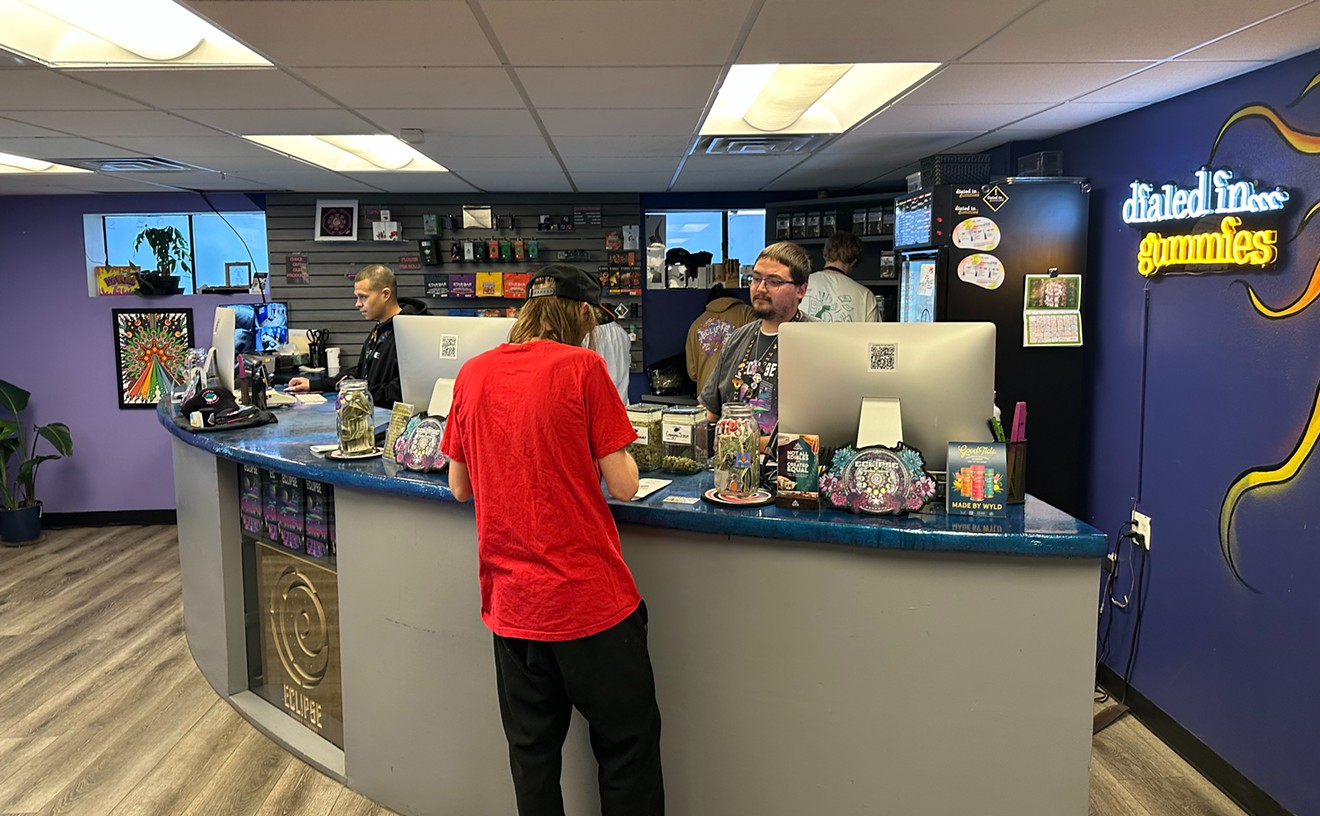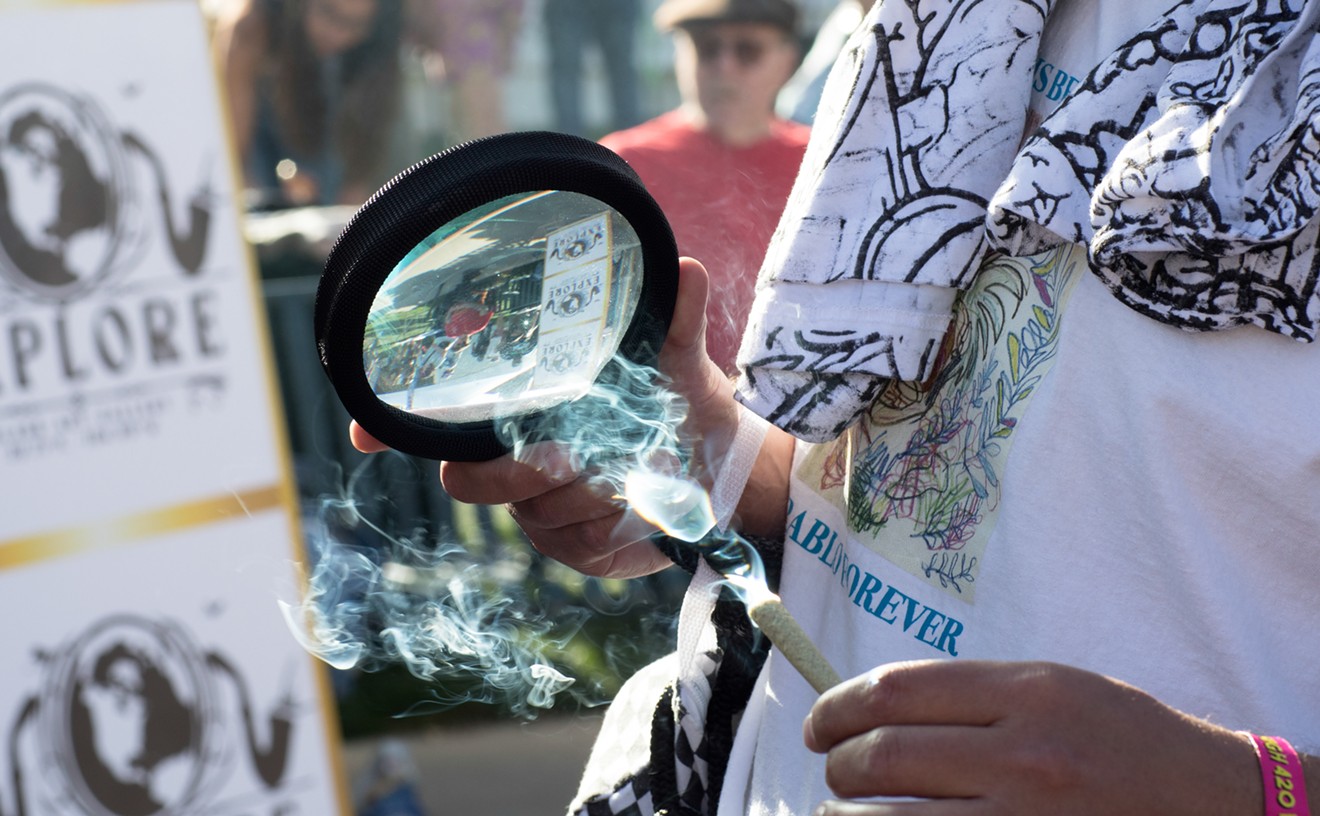A bill that would add vaping to the Colorado Clean Indoor Air Act's list of banned activities in public places cleared its first obstacle Wednesday, February 27, in a state House of Representatives committee. Written in an effort to curb Colorado's disturbingly high rate of tobacco vaping among teens, House Bill 1076 saw a lot of opposition and amendments before its first committee vote. But most of the recent dissension wasn't from the tobacco industry. It was from marijuana advocates.
The Colorado Clean Indoor Air Act that passed in 2006 banned all tobacco smoke in public places outside of cigar lounges, casinos and certain business patios. In 2013, the legislation was updated to include marijuana smoke after Colorado legalized recreational use. Now bill sponsors want the Clean Indoor Air Act to include vaping of all kinds and extend protections to hotels and retirement homes, worrying medical marijuana advocates and proponents of social pot consumption. (Tobacco store owners are now largely protected after amendments were added to the bill that would allow customers to sample vape products in their establishments, as long as no one under eighteen is allowed inside; marijuana has yet to receive the same protection.)
For many MMJ patients, vaporization and smoking are the quickest way to get THC, CBD and other cannabinoids into their bloodstreams to treat their various ailments. Since smoking in public is banned, many patients use cannabinoid vaporizers and inhalers only in medical emergencies. In the committee hearing, state representatives Dafna Michaelson Jenet and Colin Larson, who sponsored the bill, assured MMJ patients that the Americans With Disabilities Act would cover such medical emergencies if they needed to vaporize cannabis. With marijuana still being federally illegal, however, MMJ proponents weren't sold.
"I'm sure it was written with the best intentions for our young children. However, it's really broad," Colorado NORML director Ashley Weber told the House committee during the hearing. "It is a direct threat to all cannabis consumers... . It would also harm cannabis businesses as it's written right now. We, as Coloradans, encourage tourists to come try that 'Mile High,' but this would force edible use among people. And, as we know, edibles are much harder to dose."
Although public marijuana use is illegal in Colorado, Denver has legalized private-use areas for qualified businesses and events, while social clubs and tourism bus companies allow pot use through contested gray areas of the law. And Colorado Springs has also allowed several consumption spaces to operate temporarily.
Larson doubled down on his ADA defense, though, and wasn't keen on protecting social consumption businesses before state law further defines them. "This bill is not a vehicle for social consumption law," he told his colleagues. "For us to put a carve-out in for a business that is operating under a gray area of the law — I would pause on that."
State lawmakers are expected to introduce a bill later this year that would create pot hospitality licenses, which would regulate social consumption businesses and likely exempt them from any vaping bans under the Clean Indoor Air Act. But until that bill is introduced, entrepreneurs in the sate's social consumption space say they will remain concerned.
An amendment to a bill introduced by Colorado Representative Susan Lontine was intended to protect locally approved and licensed marijuana consumption businesses, but the current language won't actually shield such businesses. The language protects establishments "at which marijuana is offered to purchasers or prospective purchasers for sale or sampling," but state law bans customer samples as well as marijuana sales and consumption taking place at the same businesses.
Lontine says she introduced the amendment after speaking with Denver City Councilwoman Kendra Black, who has recommended expanding Denver's social consumption program to welcome more businesses. The mixup in language was unintentional, they both say, with Lontine adding that she would submit a new amendment if needed. "If it does need to be fixed, we can do it on second [reading]. And I’m happy to do that," she explains.
After about four hours of public testimony, HB 1076 passed through committee, 10-1. The bill is now scheduled to appear before the House on Friday, March 8.
[
{
"name": "Air - MediumRectangle - Inline Content - Mobile Display Size",
"component": "12017618",
"insertPoint": "2",
"requiredCountToDisplay": "2"
},{
"name": "Editor Picks",
"component": "17242653",
"insertPoint": "4",
"requiredCountToDisplay": "1"
},{
"name": "Inline Links",
"component": "18838239",
"insertPoint": "8th",
"startingPoint": 8,
"requiredCountToDisplay": "7",
"maxInsertions": 25
},{
"name": "Air - MediumRectangle - Combo - Inline Content",
"component": "17261320",
"insertPoint": "8th",
"startingPoint": 8,
"requiredCountToDisplay": "7",
"maxInsertions": 25
},{
"name": "Inline Links",
"component": "18838239",
"insertPoint": "8th",
"startingPoint": 12,
"requiredCountToDisplay": "11",
"maxInsertions": 25
},{
"name": "Air - Leaderboard Tower - Combo - Inline Content",
"component": "17261321",
"insertPoint": "8th",
"startingPoint": 12,
"requiredCountToDisplay": "11",
"maxInsertions": 25
}
]












